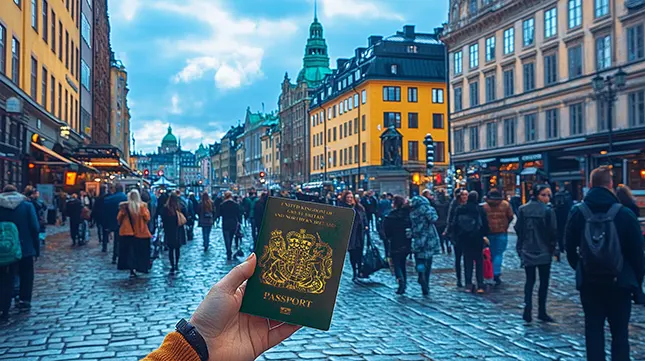Moving to Sweden from UK – A Complete Guide

Considering a move from the UK to Sweden? It is not surprising.
With its postcard-perfect landscapes, innovative cities, and world-renowned quality of life, Sweden has become a popular choice for Brits seeking a fresh start abroad.
From the clean air and low crime rates to the emphasis on family life and work-life balance, the appeal is clear.
Living in Sweden offers an entirely different pace. Think vibrant summers, snow-covered winters, and a culture that values community, sustainability, and simplicity.
Whether you’re drawn to Stockholm’s cosmopolitan buzz, Malmö’s cultural charm, or the peaceful serenity of the Swedish countryside, there’s a lifestyle here to suit every kind of expat.
This guide walks you through the essentials of relocating to this wonderful country from visas and job hunting to healthcare and housing.
Whether you’re moving there for work, study, or just a lifestyle upgrade, we’ll help you make the transition as smooth as possible.
If you dream of fika breaks, forest hikes, and a more balanced lifestyle, Sweden could be your next great adventure!
What’s Drawing Brits to Life in Sweden?

There are plenty of great reasons to make the move.
More and more UK residents are trading the bustle of British life for Sweden’s cleaner, calmer way of living, and it’s easy to understand why.
Sweden consistently ranks as one of the best places in the world for health, education, safety, and overall well-being.
It’s a country that blends modern innovation with a deep respect for nature, offering expats a chance to live sustainably while enjoying a high standard of living.
For many Brits, Sweden’s generous parental leave, strong public healthcare system, and focus on equality are major attractions.
In addition to that, English is widely spoken, integration is relatively easy, and it has become an ideal destination for individuals, couples, and families alike.
Whether you’re seeking career opportunities in tech, design, or sustainability or simply looking to enjoy a slower, more family-focused lifestyle, Sweden delivers.
The country’s emphasis on community, transparency, and balance resonates deeply with those who want to depart from UK norms.
For more on Sweden’s global appeal, check out the OECD Better Life Index.
Getting Settled: Visas and Residency in Sweden

Getting the correct visa is essential.
Before you pack your bags, you must understand Sweden’s entry and residency rules, especially post-Brexit.
As the UK is no longer part of the EU, moving to Sweden now requires a bit more planning and preparation but, it’s still entirely achievable with the right steps.
If you plan to stay in Sweden for more than 90 days, you’ll need to apply for a residence permit. This typically depends on your purpose for moving, whether it’s for work, study, family reunification, or another reason.
Work permits are generally issued to those with a valid job offer from a Swedish employer. Alternatively, family-based permits are available if you have close relatives already living in Sweden.
The Swedish Migration Agency (Migrationsverket) handles all permit applications. Their website offers helpful guidance on requirements, forms, and processing times.
It’s worth noting that applications can take several months to process, so start early.
Once approved, your residence permit allows you access to Sweden’s healthcare, education, and social systems, making it well worth the paperwork.
Working in Sweden: Career Opportunities for UK Expats

There are great employment opportunities.
Looking to launch or continue your career in Sweden?
The country’s strong economy and progressive work culture make it an appealing destination for UK professionals across many sectors.
Sweden is particularly well known for its booming tech industry, green innovation, life sciences, and engineering sectors, offering great prospects for those with the right skills.
Most Swedes speak excellent English, especially in professional environments, which can make the transition smoother for British expats.
However, learning Swedish will give you a competitive edge and improve your chances in the local job market, especially for roles in public service, education, or healthcare.
Job seekers can start by exploring sites like Arbetsformedlingen, Sweden’s Public Employment Service.
Alternatively, international platforms such as https://www.jobsinsweden.com.
If you’re a qualified professional, look into roles listed on the EURES portal which is free for both employers and employees to use. .
Swedish workplaces are known for their flat hierarchies, emphasis on work-life balance, and generous parental leave policies.
With a strong commitment to employee wellbeing and diversity, Sweden continues to attract talent from across the globe.
What Does Life in Sweden Really Cost?

Understanding living costs is vital.
When it comes to day-to-day expenses, Sweden is often seen as one of the more expensive European countries—but it’s essential to view that in context.
While groceries, transport, and dining out can cost more than in the UK, these expenses are often offset by excellent public services, higher wages, and social benefits like subsidised childcare and healthcare.
Housing costs vary depending on location.
Big cities like Stockholm, Gothenburg, and Malmö tend to be pricier, particularly when it comes to renting, which is just the same in UK cities such as London.
However, if you move outside the urban centres, you’ll find more affordable options, especially if you’re open to living in smaller towns or the countryside.
Food and transport prices can feel higher compared to the UK, but many residents balance this by cooking at home, cycling, and making use of efficient public transport networks.
Sweden’s tax rates are higher, but in return, you gain access to world-class infrastructure and a strong safety net.
For a detailed look at current prices, you can explore comparisons on Numbeo, the cost-of-living comparison website.
Finding Your Swedish Home (hem): Where and How to Rent or Buy

There are great properties in Sweden.
Securing a place to live in Sweden can be one of the trickier parts of relocating, particularly in major cities where demand for housing and rentals is high.
In Stockholm and Gothenburg, rental properties are snapped up quickly, and there’s often a queue system in place for long-term contracts. Many expats begin with sublet arrangements while they search for something more permanent.
Swedes typically rent unfurnished apartments, so be prepared to furnish your space from scratch.
Websites like https://www.blocket.se/ and https://bostad.blocket.se/ are useful for finding rentals or second-hand furniture.
You can also try https://www.samtrygg.se/ for safe subletting options.
If you plan to buy property, it’s worth contacting a local real estate agent (mäklare).
Here again, the housing market is competitive, especially in urban areas, but Sweden has a transparent process with clear legal protections for buyers.
Whether you’re renting or buying, it helps to have your Swedish personal identity number (personnummer) early on, as many housing services and contracts require it.
Take some time to read the blog Wise has published.
It provides some extremely helpful information for those intending to purchase a home in Sweden.
Patience is key, but Swedish homes are known for their comfort, quality, and style once you’re settled.
How Sweden’s Healthcare System Works for Expats

Healthcare is always an important consideration.
Sweden is known for its well-funded, high-quality healthcare system, one that consistently ranks among the best in the world.
As a UK national relocating to Sweden, you’ll be pleased to know that once you’re registered as a resident and have your personal identity number (personnummer), you’re entitled to access public healthcare on the same terms as Swedish citizens.
The system is primarily tax-funded, which means most services are heavily subsidised.
You’ll typically pay a small fee for GP visits or emergency care, but there’s an annual cap to protect you from excessive costs. Children under 18 usually receive care for free.
To register with a local health centre (vårdcentral), you’ll need your personnummer.
While English is widely spoken among healthcare professionals, having some basic Swedish phrases under your belt can be helpful.
You can find more about Sweden’s healthcare services through the national health portal.
Private healthcare is available too, though most residents rely on the public system as it is so good.
With its focus on accessibility, prevention, and equality, Sweden offers peace of mind when it comes to maintaining one’s health and that of one’s family.
Learning the Swedish Way: Schools and Education for UK Families

Families will find great schools.
If you’re moving to Sweden with children, you’ll be glad to know that the education system here is both high-quality and inclusive.
Schooling is free and compulsory from ages 6 to 16, and the emphasis is on equality, creativity, and student well-being.
Classrooms in Sweden typically foster open discussion, critical thinking, and collaboration rather than rote learning.
Public schools are known for their relaxed but structured approach.
Most offer instruction in Swedish, but many also provide extra support for non-Swedish speakers, helping children integrate quickly and comfortably.
International schools, particularly in cities like Stockholm, Malmö, and Gothenburg, offer curricula in English or other languages and follow the IB or British system, but be aware that these often charge tuition fees.
Preschools (förskola) are also popular and subsidised by the government, making childcare more affordable for working parents.
To explore school options or find an international curriculum near you, check the Swedish National Agency for Education.
Whether you opt for public or private education, Sweden’s commitment to equal learning opportunities ensures your child will receive a well-rounded start in life.
Embracing the Swedish Way of Life: Culture, Customs & Daily Living

Immerse yourself in the Swedish culture.
Life in Sweden is all about balance. Whether it’s work, family, or leisure, the Swedes have mastered the art of living well.
One of the first things British expats notice is how calm and orderly life feels. There’s less rush, more space, and a strong emphasis on personal freedom and respect for others.
Swedish culture prizes modesty, equality, and simplicity. The famous concept of lagom—meaning “not too much, not too little”—sums up the national mindset.
Don’t be surprised if your social calendar revolves around nature walks, fika (coffee and cake breaks), and seasonal traditions like Midsummer or Lucia.
Despite the cooler climate, locals enjoy the outdoors year-round. With forests, lakes, and the coast never far away, Swedes are passionate about nature and sustainability.
Recycling bins are on every street corner, and it’s common to see people biking even in winter.
While socialising can be more reserved than in the UK, friendships tend to be more profound and long-lasting.
Learn to embrace the quiet moments, and you’ll soon appreciate the richness of Swedish life.
For a peek into Swedish customs and etiquette, visit Sweden’s official site.
Sweden’s Seasonal Climate – From Snowy Winters to Midnight Sun

You’ll need to pack for all weather conditions.
Sweden’s climate is as diverse as its landscape and understanding what to expect can help you prepare for life year-round.
Winters are famously cold, especially in the north, where temperatures can drop well below freezing and snow blankets the ground for months.
However, indoor life remains comfortable even during the chilliest days thanks to excellent insulation and central heating.
In southern and central Sweden, winters are milder and more manageable, with snowy periods mixed with crisp, dry days.
Summers, on the other hand, are surprisingly warm and light filled.
In June and July, parts of the country enjoy up to 18 hours of daylight, with the famous midnight sun visible in the far north.
Rainfall is relatively moderate throughout the year, and while weather patterns can be changeable, Sweden experiences fewer extremes than the UK.
Autumn brings vibrant colours, while spring is eagerly welcomed after the darker months.
If you’re curious about seasonal averages in your future city, you can explore the weather at any time from the SMHI website.
So, whether you’re layering up for a snowy hike or enjoying a late-night barbecue in July, Sweden’s shifting seasons offer something special for every lifestyle.
What to Know About Driving in Sweden

Follow this advice if you plan on driving in Sweden.
Driving in Sweden is a practical choice, especially outside the cities where public transport can be limited.
You can legally drive on a UK licence, but for long-term stays, exchanging it for a Swedish one through the Swedish Transport Administration is advisable.
Swedish roads are generally quiet, well-maintained, and ideal for scenic travel, but there are key differences from driving in the UK:
- Drive on the right, overtake on the left.
- Seatbelts are mandatory.
- Dipped headlights must be used at all times.
- Winter tyres are required from 1 Dec–31 Mar in snowy conditions.
- Speed limits range from 60–120 km/h.
- On-the-spot fines apply for violations.
- Wildlife (like moose) can cross rural roads.
- Petrol stations are sparse on motorways—plan ahead.
- Emergency number: 112
City parking may be restricted; always check signage to avoid hefty fines.
The RAC offers some convenient advice and tips for those intending to drive in Sweden.
With the proper prep, driving is a fantastic way to explore Sweden’s breathtaking landscapes safely and confidently.
Swedish Krona: What You Need to Know About Currency
Sweden’s official currency is the Swedish Krona (SEK), sometimes written as “kr.”
One krona comprises 100 öre, though öre coins are no longer in circulation.
Banknotes come in 20, 50, 100, 200, 500, and 1,000 kronor denominations, while coins are issued in 1, 2, 5, and 10 kronor.
Before moving, it’s wise to monitor exchange rates to get the best value when converting your money.
You can track live currency rates between the British Pound and the Swedish Krona via the Exchange Rates.org.uk website.
While cash is still accepted in some places, Sweden is largely cashless.
Most shops, cafés, and services prefer card or mobile payments, so it’s essential to have a debit or credit card ready for daily use.
Banking in Sweden: Opening an Account as a UK National

Setting up a Swedish bank account is easy but essential.
Setting up a bank account in Sweden is straightforward, but you’ll need to do it in person due to strict ID verification laws. Online applications aren’t typically accepted for newcomers.
To open an account, bring your passport and, if you have one, your Swedish personal ID number (personnummer).
Non-EU/EEA residents can still open a basic bank account, even without a personnummer, though services may be limited at first.
Leading banks include Swedbank and Nordea, both of which offer English-language services.
Sweden is a card-first society, so don’t expect to use much cash.
From supermarkets to museums, almost everything is paid for using cards or mobile apps like Swish.
Understanding Swedish Taxes: What Expats Need to Know
Sweden’s tax system is one of the most progressive in the world and yes, it’s known for its high rates. But most residents gladly pay, thanks to the excellent healthcare, childcare, and infrastructure those taxes support.
If you plan to live in Sweden full-time, you must register with the Swedish Tax Agency (Skatteverket).
Standard income tax is around 30%, with additional contributions if you earn above certain thresholds.
For example, those earning over 433,000 SEK annually may pay up to 55% in combined taxes.
On the flip side, low earners—below 18,800 SEK per year—aren’t taxed at all.
Value Added Tax (VAT) is typically 25%, and other taxes may apply, including on property, capital gains, and inheritance.
You can find a complete overview of Sweden’s tax system by visiting the Skatteverket website.
Weighing It Up: The Upsides and Challenges of Life in Sweden
Sweden has a lot going for it, but like any international move, relocating from the UK comes with both rewards and potential challenges.
Understanding and weighing up the pros and cons upfront will help you settle in with realistic expectations.
On the plus side, Sweden offers a high standard of living, excellent public services, and a strong sense of safety and stability.
You’ll find a healthy work-life balance, scenic natural surroundings, and a clean environment.
The public transport system is reliable, and the country is famously family-friendly, with generous parental leave and subsidised childcare.
However, there are some adjustments. The cost of living can be steep, especially in cities, and housing can be hard to find.
The winter darkness may take time to get used to, and social integration can feel slow, as Swedes tend to be reserved at first.
That said, most expats adapt well and find life in Sweden both fulfilling and inspiring once they embrace the local rhythm.
As long as you do your homework and are well prepared for life in Sweden, you will feel right at home soon enough.
Ready to Make Sweden Your New Home?

Relocating to Sweden from the UK is much more than just a change of scenery, it’s a lifestyle upgrade.
With its clean cities, stunning landscapes, and forward-thinking society, Sweden offers a unique blend of opportunity and tranquillity.
From the practical steps of securing a residence permit to embracing local culture, this guide has equipped you with the essentials for a smooth transition.
Whether you’re chasing career goals, raising a family, or simply craving a fresh start, Sweden makes it easy to feel at home.
And with the right planning and help from a trusted removals partner like White & Company, you’ll be unpacking your life in one of Europe’s most liveable countries in no time.
Got questions or need expert help with your move? Simply give us a call or visit our website for all the help you need.
White & Company has decades of experience helping individuals and families move from the UK to Sweden.
Everything is taken care of from packing and customs documentation to safe delivery at your new home.
With options for both full and part-load shipments, you can choose a service that fits your timeline and budget.
For that little extra peace of mind, White & Company is a fully accredited member of the British Association of Removers (BAR), which ensures high standards and reliable service.
Once your belongings are in transit, you can focus on the excitement of starting fresh in your new Swedish hem (home).

Max is a seasoned writer and blogger in the real estate and home moving sectors, as well as a knowledgeable source of information for expatriates living and working abroad. His detailed insights have helped thousands of people move and live abroad with greater simplicity and ease.
Posted in: News
Leave a Comment (0) ↓


